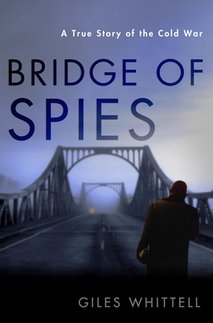
09 Nov 2010 20:56:00
"Bridge of Spies: A True Story of the Cold War" (Broadway Books $24.99), by Giles Whittell: Two highly trained Cold War spies — one American, one Soviet — both failed in their most important missions. Neither was entirely to blame. Giles Whittell, Washington bureau chief for The Times of London, sees much greater import in the American fiasco.
"It gave us 30 years of cold war that might very well have been avoided," he writes in "Bridge of Spies." It's a factual account of events half a century ago, as convoluted and thrilling as any spy novel, as the author sets out the mysteries of spy craft in fascinating detail.
In 1960, Francis Gary Powers was flying a supposedly unattackable spy plane in a vain hunt for Soviet intercontinental missiles. He was shot down nevertheless on the eve of a promising summit conference. Before the meeting started, Nikita Khrushchev had ordered that Soviet forces be cut by a third. He saw missiles as the weapon of the future, rather than masses of infantry or tanks.
A crude but perceptive leader, he may have calculated that fear of nuclear catastrophe on both sides would prevent World War III between the two superpowers. He boasted — misleadingly — that Soviet factories were turning out missiles "like sausages." The Soviets had many military missiles of different ranges, but the rockets capable of powering intercontinental weapons were few and hard to use.
Many in the West hoped tensions would ease. Powers' overflight had the opposite effect: Khrushchev demanded an apology. President Dwight D. Eisenhower refused. Khrushchev walked out. A Soviet court sentenced Powers to 10 years confinement.
Three years before, a federal court in New York had sentenced Col. Rudolf Abel to 30 years for conspiracy to transmit defense information. It was the best-known of many aliases used by William Fisher, British-born but Soviet-loyal. He had spent nine years at large in the United States as Moscow's top undercover intelligence agent.
His unfulfilled mission was to revive the World War II network of spies that had helped the Soviets build their first atomic bomb. Sympathy in the U.S. for the Soviet Union had faded with the end of the fighting. The FBI and prominent congressmen were both running active anti-communist campaigns.
Abel spoke five language and was a skilled radio man. He was adept at spy craft — like splitting a nickel to hide a bit of microfilm, although American counterintelligence may have wondered why the KGB wanted an occasional nickel. He was less effective at recruiting, but he might have been able to keep trying if Moscow hadn't sent him an assistant, an incompetent drunk who betrayed him to the Americans.
At Abel's trial, Whittell writes, prosecutor William F. Tompkins "failed to prove that (Abel) had actually stolen or transmitted a single secret of any kind ..."
Under a satellite Communist government, a clever lawyer in East Berlin managed to get the United States and the Soviet Union to agree on an exchange of the two imprisoned spies.
"It gave us 30 years of cold war that might very well have been avoided," he writes in "Bridge of Spies." It's a factual account of events half a century ago, as convoluted and thrilling as any spy novel, as the author sets out the mysteries of spy craft in fascinating detail.
In 1960, Francis Gary Powers was flying a supposedly unattackable spy plane in a vain hunt for Soviet intercontinental missiles. He was shot down nevertheless on the eve of a promising summit conference. Before the meeting started, Nikita Khrushchev had ordered that Soviet forces be cut by a third. He saw missiles as the weapon of the future, rather than masses of infantry or tanks.
A crude but perceptive leader, he may have calculated that fear of nuclear catastrophe on both sides would prevent World War III between the two superpowers. He boasted — misleadingly — that Soviet factories were turning out missiles "like sausages." The Soviets had many military missiles of different ranges, but the rockets capable of powering intercontinental weapons were few and hard to use.
Many in the West hoped tensions would ease. Powers' overflight had the opposite effect: Khrushchev demanded an apology. President Dwight D. Eisenhower refused. Khrushchev walked out. A Soviet court sentenced Powers to 10 years confinement.
Three years before, a federal court in New York had sentenced Col. Rudolf Abel to 30 years for conspiracy to transmit defense information. It was the best-known of many aliases used by William Fisher, British-born but Soviet-loyal. He had spent nine years at large in the United States as Moscow's top undercover intelligence agent.
His unfulfilled mission was to revive the World War II network of spies that had helped the Soviets build their first atomic bomb. Sympathy in the U.S. for the Soviet Union had faded with the end of the fighting. The FBI and prominent congressmen were both running active anti-communist campaigns.
Abel spoke five language and was a skilled radio man. He was adept at spy craft — like splitting a nickel to hide a bit of microfilm, although American counterintelligence may have wondered why the KGB wanted an occasional nickel. He was less effective at recruiting, but he might have been able to keep trying if Moscow hadn't sent him an assistant, an incompetent drunk who betrayed him to the Americans.
At Abel's trial, Whittell writes, prosecutor William F. Tompkins "failed to prove that (Abel) had actually stolen or transmitted a single secret of any kind ..."
Under a satellite Communist government, a clever lawyer in East Berlin managed to get the United States and the Soviet Union to agree on an exchange of the two imprisoned spies.

